CYPRUS: WELCOME TO THE SONGBIRD KILLING FIELDS.
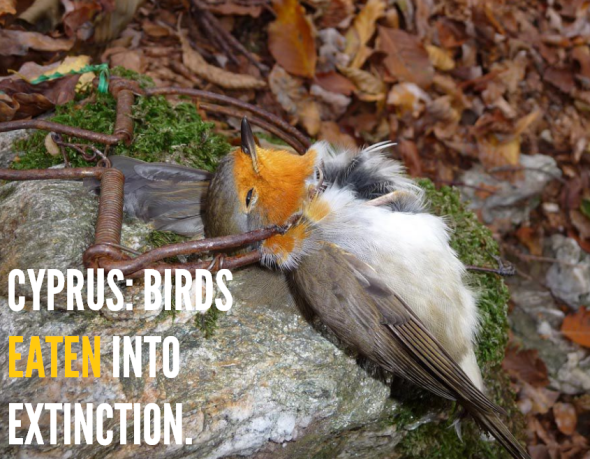
WELCOME TO THE CYPRUS KILLING FIELDS
Just over a week ago, while walking through the local woodland gardens, I noticed a little European robin that just happened to perch next to a fence no more than a few meters in front of me. I was taken aback because, this was the first robin sighting in as many years, today its actually quite rare to spot them, and while I embraced the moment, it dawned on me, why wasn’t I witnessing more of these beautiful birds within the wild?.
Robins normally head south to winter on the Continent, joining other robins passing through in the autumn on their way from Scandinavia and northern continental Europe. Interestingly, it has been shown that many migrating robins are faithful to both their summer and winter territories, which may be many hundreds of kilometers apart. Regardless of where they migrate though I myself and many other conservationist’s are seeing fewer and fewer robins and other song birds.
Every day when I awake I spend a few minutes trying to identify the number of songbirds singing within the wild within the confines of my garden. One can normally identify each individual species of bird by its unique signature melody. As a young boy it was almost difficult to identify more than a handful due to so many songbird species inhabiting the local areas. Today I can identify no more than two or three if that, and in relation to the rare sightings of robins and songbirds - this tells me only one thing - we’re losing our songbirds at an alarming rate!.
Its estimated every year that a staggering TWENTY SEVEN MILLION songbirds are slaughtered on the Mediterranean. Songbirds are unfortunately ending up on the plates of many Cypriots - to the tune of some 1.3 million, of which this number is increasing every year. Cyprus like every country hosts a wide range of traditional and culinary delights. However this culinary tradition must come to an abrupt end - very soon across the entire Mediterranean (not just Cyprus), failing this mass songbird extinctions will occur.
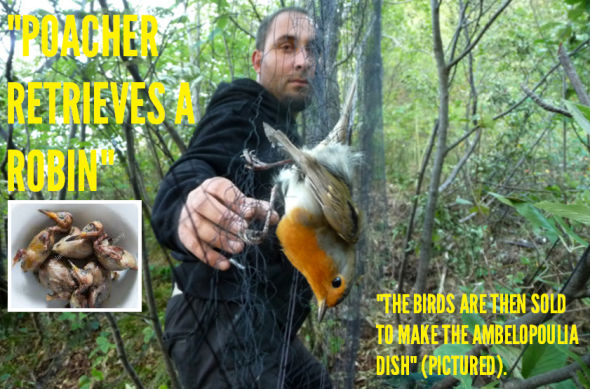
Image: Poached robin, (inset) ambelopoulia song bird delicacy.
Unfortunately one of them so called ‘traditional culinary delights’ is that of boiled songbirds. And please don’t for one minute think I’m singling out Cyprus here. My own country hosts a number of nauseating traditional foods that sees ducks, geese even swans butchered to provide Foie Gras and, songbirds too. Germany sells a number of robin dishes, while Malta is an even bigger offender killing hundreds of thousands of birds every year just to provide a so called “traditional food” for the locals and foreigners. Songbirds are vanishing from the Mediterranean, and the rate at which they’re being eaten is very likely to push many species into extinction in the next decade.
Cyprus has a plethora of customs due to its long history and tradition and numerous distinctive dishes for visitors to taste. The best place to do this is in one of the many traditional tavernas dotted around the island’s attractive villages, where one could order a selection of Cyprus dishes such as koupepia, souvla, kolokasi, pourgouri, seftalies and makaronia tou fournou to name just a few. For the ultimate gastronomic experience in Cyprus, the best way to try all of these and more in one sitting is as ‘mezedes’, a selection of more than 20 vegetable and meat dishes – make sure you are hungry as food will be plentiful.
However while all of these dishes may sound, look and even taste nice, a large minority of individuals on the island of Cyprus (not all), indulge in the local and traditional delicacy of boiled or grilled songbirds. Back in 1974 the government of Cyprus was lobbied and pressured to ban songbird trapping, and poaching. Today its currently still illegal to trap songbirds (as seen in the image above). While these laws prohibit anyone from illegally trapping, killing and serving up ambelopoulia - the law is very rarely enforced, which does concern us dearly. Furthermore what’s the point in having laws in place (since the 1970’s) if you’re not going to follow through with them?
AMBELOPOULIA
Mention ambelopoulia to a songbird - and it sends shivers through them, (well not literally); ambelopoulia is though the main Cyprus culinary delight - of which songbirds are pickled, roasted, grilled or boiled served with a number of vegetables or sweet fruit sauces. The traditional food normally involves boiling songbirds. The two common species of birds eaten are that of blackcaps and European robins - which is probably why I’m seeing fewer songbirds every year.
As a result almost 2,418,000 birds across the whole of Cyprus were estimated to have been killed during 2010. According to a BirdLife Cyprus report released in 2014, over 1.5 million migrating songbirds are killed annually, and the number is increasing each year. In 2015 it was estimated that over 2 million birds were killed including over 800,000 on the British Territories. Now there are new reports issued this year by various bird groups that confirm we are losing a staggering 27 million songbirds every year on the Mediterranean - many of which are killed for human delicacies.
Songbirds are trapped, killed, trafficked and consumed within many European countries. Spain, Germany, Italy, France, Belgium, Greece, Romania, Serbia, Slovenia, Russia, Malta, and of course Cyprus - all of which is mostly illegal. What makes matters even worse (in relation to Cyprus) is that a large number of songbirds are actually killed on the local British military bases on the island, so why are the Brits allowing this dare I ask?. Birdlife Cyprus stated in a report this year: “Over 800,000 birds were trapped and killed illegally on a British military base in Cyprus last autumn, according to the latest research by the RSPB and BirdLife Cyprus”.
Organised crime gangs are running this illegal practice on an ‘industrial scale’, which is estimated by the Cypriot authorities to earn criminals on the island 15 million Euros every year. Survey data from BirdLife Cyprus and other organisations have recorded over 150 species of bird which have become trapped in mist nets or on lime-sticks (pictured below). More than half of these species are of conservation concern. On a positive note, the results from 2015 show that there’s been a stop to the ‘annual increases’ of the last five years in numbers of birds killed on British Territory, thanks to various measures taken to tackle the problem by the Base authorities. The numbers however remain around record-breaking levels, with levels of illegal killing still far worse on British Territory than in the Republic of Cyprus.
The trappers defend their activity by citing the practice as traditional Cypriot food gathering and claiming that this has been an important source of protein for the natives for many thousands of years, even though the practice has been illegal since 1974. BirdLife Cyprus has identified restaurants as the main culprits as they provide the financial incentives. The enthusiasm Cypriots and many other visitors to the island have for this delicacy despite its illegality has resulted in the development of a very profitable industry.
Poaching for ambelopoulia has been on the rise in recent years, involving by 2011 a “mafia-like operation” that include poachers, dealers, exporters, and restaurant operators that participate in the illegal business estimated to be worth about 5 million euro at that time (2011). The birds reportedly sell for five euros each and it is estimated by Cypriot authorities to have earned criminals on the island 15 million euro in 2015.
LIME STICKS
Cypriot poachers illegally poach songbirds using a number of methods. One of them (seen pictured below) are lime sticks. The use of lime sticks is ‘strictly illegal’, however as explained above, despite laws in place on the island local authorities still turn a blind eye.
Lime sticks are a simple but particularly cruel and indiscriminate method of trapping birds. ‘Twigs’ are covered with a sticky ‘lime’ or ‘glue’ (in Cyprus trappers traditionally used a concentrate made from boiled Syrian plums) and are placed wherever birds can be tempted to perch. This could be in natural vegetation like bushes or trees, or sometimes lime sticks are pushed into the ends of bamboo poles. And as you guessed - once the bird lands on the lime stick they are stuck fast.
The more the bird struggles, the more it becomes entangled within the sticky like natural/unnatural substance. Songbirds die a horrific death, struggling for hours before being crushed to death by poachers, or dying of extreme exhaustion and stress. Just in one area (such as local gardens alone), its estimated that ‘hundreds of lime sticks are set up to catch as many birds as possible’. More than TWO MILLION songbirds are illegally poached using this method of trapping - which is cruel, painful, and totally barbaric.
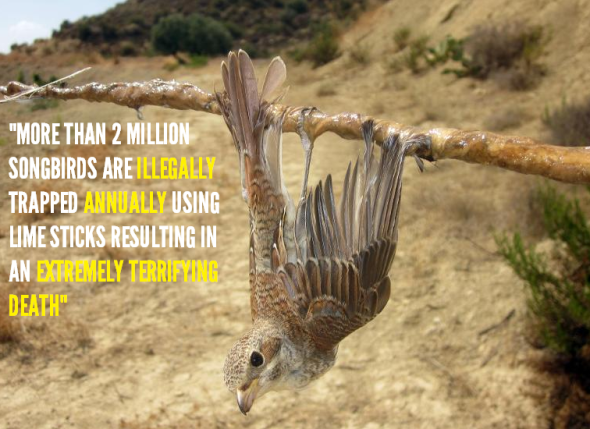
Image: Lanius collurio (Red Backed Shrike) trapped using a lime stick.
In Cyprus alone its “estimated that some one million songbirds are caught using this method of illegal trapping. Most of the sticks are set up within residents gardens - which makes policing even more difficult. One must also think - how is it even possible for every single home within Cyprus to be monitored by the local authorities?.
Lime sticks are so effective because when a bird lands its legs bend causing two flexor tendons to tighten which ‘lock’ the toes around a perch. This involuntary reflex (designed to stop perched birds falling while they sleep) means that the bird in effect presses down hard into the ‘lime’ as soon as it makes contact with it. Birds become stuck immediately. As they flutter to free themselves their wings, head, and even beak will often become stuck too.
“TRAPPERS RIP THE BIRDS FROM THE LIME STICK AND CRUSH THEM TO DEATH”
Birds caught on lime sticks are unable to get free and hang helplessly – often for hours – until the trapper comes and literally rips them off the stick and crushes them to death.
Article 9 of the European Birds Directive (2009/147/EC, formerly 79/409/EEC), states that trapping methods that are non-selective or are used for large-scale capture or killing of birds are prohibited in European Member States. This includes lime sticks, and their manufacture, sale, ownership, and use is therefore illegal across the EU. Unfortunately while this horrific method of trapping may indeed be illegal - poachers are still getting away with murder.
MIST NETS
I’ve spent a number of years living on the small island of Malta (on and off) and, a number of years trying to destroy these bloody nets with the help of many local and overseas activists. Mist nets are just as cruel and barbaric as lime sticks, although I must state that birds are caught instantly, and killed there and then - nevertheless their deaths are still horrific.
Mist nets are often use by poachers on the island of Cyprus to catch a larger number of birds, meanwhile these very same poachers will also have lime sticks deployed within key areas. So it kind if gives you a little more insight into just how greedy poachers and buyers have become. Furthermore the rate at which we’re losing songbirds - and the levels of poaching increasing, what’s next when extinction finally does occur. Mist nets are also used within Spain, France, Romania, and Germany (among many other EU countries).
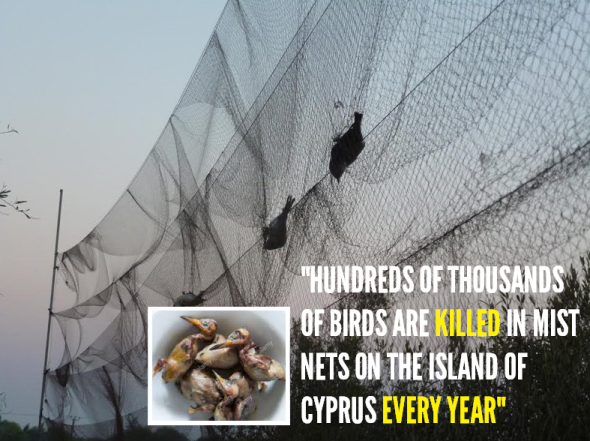
Image: Mist nest. Inset is the local delicacy of Cyprus.
Its estimated (just in Cyprus alone), hundreds of thousands of birds are caught and brutally slaughtered within mist nets every year, and with over a million more using lime sticks - and with laws rarely enforced on the island of Cyprus, will we be seeing a colossal extinction soon of migrating songbirds? I hate to say this, but unless laws are enforced and action is taken against poachers on a larger scale - extinctions will occur.
International Animal Rescue Foundation France has thus far located a total of 139 restaurants on the island of Cyprus, of which we have uncovered out of them 139 some 24 which are selling illegally ambelopoulia. I.A.R.F.F believe that the number of restaurants illegally trading ambelopoulia is much greater than 24. Furthermore due to the dish being so popular and craved after, its highly likely that the ‘majority’ of restaurants are trading ambelopoulia. International Animal Rescue Foundation France are calling on all tourists to please BOYCOTT all Cyprus restaurants that are trading openly this vile and cruel so called delicacy.
The birds sell for approximately CY2.00. One tourist stated: “Consumers are encouraged to swallow the bird whole”. On a plate you’re normally served in between four to five songbirds, and a number of other dishes too. If you are a tourist please, please do not indulge in this delicacy, and report the restaurant immediately to the local police. Another tourist that visited the area of Laxia, stated: “Laxia is somewhat of a favorite with the police, mayor and local mafia. So if there’s anything illegal going on you’ll probably find it there”. From what we are aware locals don’t encourage you to swallow the dead boiled bird[s] whole, however it wouldn’t be somewhat of a shock if this was factual.
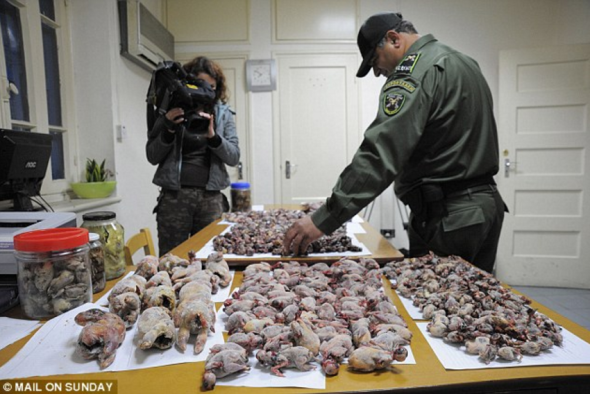
Image: Poached songbirds confiscated from poachers on the UK armed forces base.
“WHY ARE SONG BIRDS IMPORTANT?”
Songbirds are an incredibly important species of bird consisting of over 159 separate species that are endemic mostly to Europe, and as far away as Asia, America, Canada and Africa. While eating them may seem “important or traditional”, scientifically speaking you’re actually harming the environment, and removing yet another food chain link that many other species of animals depend on.
For management purposes, songbirds are part of a group called “land birds,” species that rely mainly on terrestrial habitats and some vegetated wetlands. Songbirds eat a wide variety of foods, including insects, seeds, berries, nectar, and fruit. If we lose our songbirds there will be a dramatic increase of insects, and an alarming decrease in foods that we humans also require.
Furthermore we and other animals need songbirds to continue the spread of plant, fruit and vegetable seeds to ensure that we and animals don’t go hungry. The same applies to fruit trees and bushes too. Many songbirds pollinate fruit trees and bushes - of which them plants and trees provides humans and animals fruits and berries. Finally as explained above - many songbirds are also a vital bird crop pollinator - should extinction occur, then we’ve lost a massive pollinating species that we humans and animals rely on. Are you ready to pollinate crops by hand, or prepared to pay higher prices for fruit and vegetables?
Reptiles, snakes, lizards, and even marine species such as sharks eat songbirds which are part of their diet. No songbirds means a drastic decline of food prey for reptiles, snakes, lizards, marine and amphibious species. So while you may not think songbirds are important - they truly are. Because the trapping methods are non-selective, 150+ species are known to have been caught in the traps. More than a third (58 species) of these are species of conservation concern, including the lesser kestrel, which is vulnerable to global extinction.
Extinction here is really not an option and, we must do more to preserve and secure our songbirds habitat and them too. There are many links and a handful of videos within this article, plus many alarming facts. Please share, and please help us and many other groups defend Mother Natures songbirds. If you see a trap or mist net, please report it. If you can destroy them traps without harm coming to yourself, then please do so. You can even call on us and other groups to destroy these illegal traps too.
“EXTINCTION IS NOT AN OPTION”
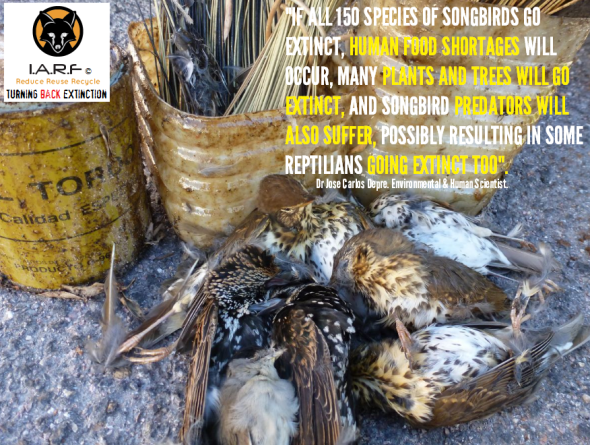
Thank you for reading.
Dr Jose Carlos Depre.
Environmental, Botanical & Human Scientist
PhD. MEnvSc. BSc(Hons) Botany, PhD(NeuroSci) D.V.M.



Thank you for your reply, should it merit a response we will respond in due course. This site is owned by International Animal Rescue Foundation and moderation is used.